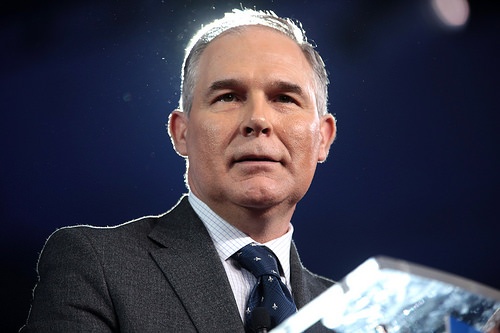On May 23, the Trump Administration issued its budget proposal for federal Fiscal Year (FY) 2018 (October 1, 2017 through September 30, 2018), subtitled “A New Foundation for America’s Greatness”. The proposal includes a 31% cut in the Environmental Protection Agency (EPA) budget, from $8.2 billion in FY 2016 (stable in FY 2017 under a Continuing Budget Resolution rather than a fully-new federal budget), to $5.7 billion for FY 2018, with corresponding personnel cuts from 15,376 full-time-equivalent employees (FTE) to 11,611. Although presidents’ annual budget proposals are rarely enacted in full, they do mark the formal start of annual considerations of federal policies and staffing. It’s therefore useful to review how President Trump and EPA Administrator Pruitt hope to proceed.
Read MoreAudit, Compliance and Risk Blog
Tags: Environmental risks, Environmental, EPA, climate change
New California Guidance For Workplace Anti-Harassment Efforts
Posted by Jon Elliott on Tue, Jun 27, 2017
Last year, the state Department of Fair Employment and Housing (DFEH) adopted a requirement that employers with five or more employees create detailed written policies for preventing harassment, discrimination, and retaliation. This month, DFEH issued detailed guidance addressing these anti-harassment requirements. These new guidelines should be required reading for California employers, and non-California employers should take the opportunity to compare their own efforts against these recommended best practices.
What Are California’s Harassment Prevention Requirements?
Effective April 1, 2016, DFEH regulations require California employers with five or more employees to create detailed written policies for preventing harassment, discrimination, and retaliation. DFEH claims finds authority for this requirement in the state Fair Employment and Housing Act (FEHA) prohibitions against discrimination, harassment and retaliation, and in FEHA’s requirement that employers “take reasonable
steps to prevent and correct wrongful (harassing, discriminatory, retaliatory) behavior in the workplace.”
Anti-harassment policies must do all of the following:
Tags: Employer Best Practices, Employee Rights, California Legislation, Workplace violence
Thinking About Occupational Hearing Protection After Better Hearing and Speech Month
Posted by Jon Elliott on Thu, Jun 22, 2017
May was Better Hearing and Speech Month, and the National Institute for Occupational Safety and Health (NIOSH reminded employers that Occupational hearing loss (OHL) is one of the most common work-related illnesses in the United States. Each year, about 22 million U.S. workers are exposed to hazardous noise levels at work. NIOSH reports that U.S. employers paid more than $1.5 million in penalties for not protecting workers from noise in 2016, and that $242 million is spent annually on workers' compensation for hearing loss disability.
Read MoreTags: Employer Best Practices, Health & Safety, OSHA, Employee Rights
What Will U.S. Withdrawal From Paris Accord Mean For Climate Change?
Posted by Jon Elliott on Tue, Jun 20, 2017
On June 1, President Trump announced that the United States will withdraw from the Paris Accord on climate change, and then seek to “begin negotiations to reenter either the Paris Accord or a really entirely new transaction on terms that are fair to the United States, its businesses, its workers, its people, its taxpayers.” Most of the strong reactions I’ve seen – pro and con – express only superficial approaches to the implications of the decision. In this note I’ll dig a little deeper, and propose two different less-superficial ways to watch these implications play out.
Read MoreTags: Environmental risks, Environmental, EPA, climate change
ASTM Updates Phase 1 ESA Standard for Forestland and Rural Properties
Posted by Rebecca Luman on Wed, Jun 14, 2017
On December 1, 2016, ASTM International (ASTM) approved revisions to ASTM E2247-08, Standard Practice for Environmental Site Assessments: Phase I Environmental Site Assessment Process for Forestland or Rural Property. The revisions were made as part of ASTM’s normal review process and through a working group of ASTM’s Committee E50 on Environmental Assessment, Risk Management, and Corrective Action. The changes are aimed at prospective purchasers conducting All Appropriate Inquiries (AAI) on forestland and rural property, and include updated methodology for site reconnaissance, clarified language for recognized environmental conditions, and removal of unessential information. This current version, now designated E2247-16, replaces the “historic” 2008 version as ASTM’s current consensus-based standard.
Read MoreCitizen Suit Against Exxon Yields $20 Million Penalty For Refinery’s Clean Air Act Violations
Posted by Jon Elliott on Tue, Jun 06, 2017
On April 26, a federal district judge in Houston issued an order assessing Exxon Mobil nearly $20 million in civil penalties for thousands of Clean Air Act (CAA) violations at Exxon’s massive Baytown, Texas refinery and petrochemical complex. This decision is the latest in a long-running “citizen suit” enforcement case, seeking additional penalties to claw back the “economic benefits from noncompliance,” on top of nearly $1.5 million in civil penalties already assessed by the Texas Commission on Environmental Quality (TCEQ) for the same violations. This decision illustrates the power of these private enforcement cases, which may become more important if the Trump Administration eases its own enforcement efforts.
Read MoreTags: Environmental risks, Environmental, ghg, climate change
Latest Department of Justice Guidance for Evaluating Corporate Compliance Programs in Criminal Investigations
Posted by Jon Elliott on Tue, May 23, 2017
Earlier this year, the US Department of Justice (DOJ) Fraud Section issued additional enforcement guidelines to US Attorneys, entitled “Evaluation of Corporate Compliance Programs.” DOJ’s US Attorneys perform these evaluations to weigh whether and how severely an organization might be charged for illegal conduct by directors, officers, or other employees. But individuals may be committing crimes to further the organization’s goals (remember Volkswagen’s recent use of fraudulent means to defeat emission requirements), or for their own purposes despite organizational efforts. For readers in organizations that aren’t encouraging criminal behavior, these guidelines provide important guidance to the design (and implementation) of effective compliance programs.
Read MoreTags: Corporate Governance, Business & Legal, Accounting & Tax, Audit Standards, Environmental risks, Environmental, corporate social responsibility, directors, directors & officers
How long can a new President’s policy changes take? I’ve been writing about President Trump’s attempts to roll back environmental requirements, and cautioning that some changes can be fast (like immediate repeal of his predecessor’s executive orders regarding climate change) while others will require multi-year rulemakings to revise finalized regulations (like EPA’s review of the greenhouse gas emission limits under the Clean Air Act, both extremes appear in a recent Executive Order I discussed here). On April 11 the federal Court of Appeals for the D.C. Circuit issued a reminder that regulatory changes can take a long time. The Court revoked several environmental reporting exemptions adopted by EPA in the last month of George W. Bush’s administration (December 2008, effective on the day of President Obama’s inauguration January 20, 2009) – culminating a year-long rulemaking and setting of 8 years of administrative and judicial appeals. So this regulation-reducing effort took 9 years to fail.
Read MoreTags: Environmental risks, Environmental, EHS, climate change
EPA Administrator Scott Pruitt has been on a tour to publicize his efforts to get EPA “back-to-basics.” He launched the tour with a visit to a Pennsylvania coal mine in April. The agency issued a press release about that visit, which also summarized its “Back-to-Basics Agenda.” The press release summarizes the Agenda as “Protecting the environment; engaging with state, local and tribal partners; and creating sensible regulations that enhance economic growth.” The Agenda provides a convenient rhetorical framework for the new Administrator’s efforts to re-boot EPA’s activities.
Read MoreTags: Environmental risks, Environmental, EPA, Greenhouse Gas, ghg, Hazcom, Oil & Gas, climate change, tsca, clean water










